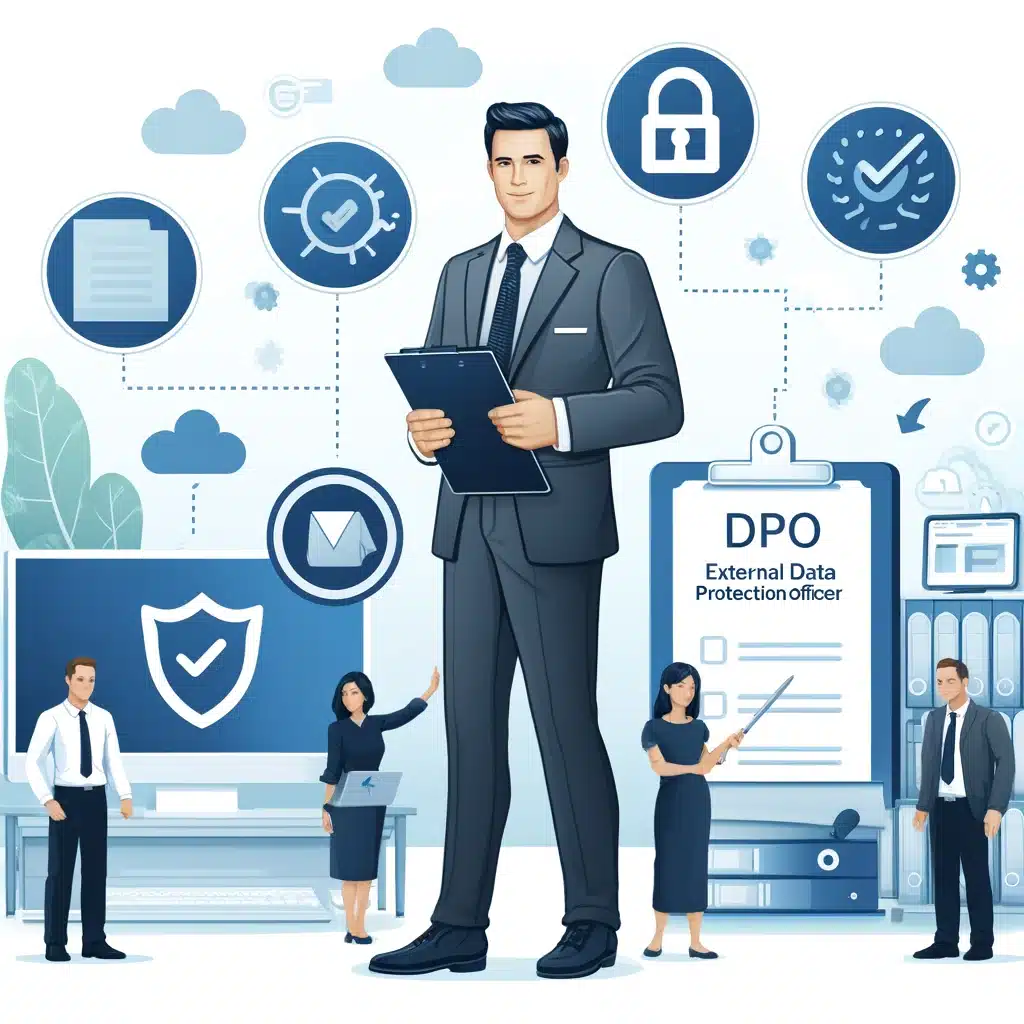Introduction
Data protection has become a priority for businesses of all sizes, especially with the entry into force of the General Data Protection Regulation (GDPR). A Data Protection Officer (DPO) plays a crucial role in this process. But why choose an external DPO over an internal DPO? This article explores the role of an external DPO and the benefits they offer.
What is an external DPO?
An external DPO is a professional mandated by a company to ensure compliance with data protection regulations, including the GDPR. Unlike an internal DPO, he or she is not employed full-time by the company, but provides his or her services on an outsourced basis.
The role of the external DPO is defined by the GDPR and includes several key responsibilities to ensure that companies meet their data protection obligations.
What are the responsibilities of an external DPO?
The responsibilities of an external DPO include:
- Advice and information: Inform and advise the company on its data protection obligations. This includes implementing best practices to protect sensitive information.
- Compliance monitoring: Oversee compliance with data protection regulations and internal policies. The external DPO conducts regular audits to ensure that the company’s practices are in line with legal requirements.
- Training and awareness: Organize training sessions to raise staff awareness of data protection issues. Continuous training is essential to ensure that all employees understand the importance of data protection.
- Request management: Manage data access requests and user complaints. This includes responding to individuals’ requests regarding their rights to access, rectify or delete their personal data.
- Cooperation with authorities: Be the point of contact with data protection authorities. The external DPO must be able to respond to investigations and cooperate with authorities in the event of data breaches.
The advantages of an external DPO
- Specialized expertise: External DPOs are typically certified experts and have extensive experience in the field of data protection. Their in-depth knowledge of regulations and best practices ensures optimal compliance. By hiring an external DPO, companies benefit from specialized skills without having to invest in costly training for an internal employee.
- Objectivity and impartiality: By being external to the company, the DPO can operate in an impartial manner, without being influenced by internal interests. This objectivity is crucial for identifying and resolving compliance issues. The external DPO brings an independent perspective that can help identify risks that internal employees might overlook.
- Cost Reduction: Employing a full-time internal DPO can be costly, especially for SMEs. An external DPO offers a more flexible and cost-effective solution, often charging for their services based on the specific needs of the business. This allows businesses to benefit from a high-quality service without the costs associated with permanent employment.
- Flexibility: Data protection needs can change over time. An external DPO offers the flexibility needed to adapt services as the business and regulations evolve. Whether for a specific project or a one-off audit, the external DPO can adjust his involvement according to the requirements of the moment.
- Access to a network of experts: Often, external DPOs are part of firms or networks of professionals specialized in data protection. This allows the company to benefit from the collective expertise of a group of experts rather than relying on the knowledge of a single person.
To learn more about the advantages of hiring an external DPO in your company you can consult our dedicated article.
The challenges of DPO outsourcing
Despite the many benefits, outsourcing a DPO also presents challenges:
- Integration into the company: An external DPO must understand the culture and internal processes of the company to be effective. This may require an adaptation period and continuous communication with the different teams in the company.
- Availability: Since an external DPO may work with several clients, his or her immediate availability may sometimes be limited. It is therefore important to clearly define expectations in terms of responsiveness and availability.
- Privacy: The management of sensitive data by an external entity may raise privacy concerns. It is crucial to ensure that the external DPO strictly adheres to the company’s privacy and data protection policies.
How to choose the right external DPO?
- Certification and experience: Look for external DPOs who are certified and have significant experience in your industry. Certifications such as CIPP/E (Certified Information Privacy Professional/Europe) or CIPM (Certified Information Privacy Manager) or Veritas certification can be indicators of competence.
- References and recommendations: Ask for references and check reviews from past clients. Recommendations from other companies in the same industry can also be very helpful in assessing the quality of the services offered.
- Understanding your business: Make sure the external DPO understands the specifics of your business, including its business goals, organizational structure, and data protection challenges.
- Cost and flexibility of services: Compare the costs of services offered and assess the flexibility in terms of delivery (one-off projects, regular audits, etc.). Make sure the contract includes clear clauses regarding response times and availability.
- Privacy Commitment: Verify that the external DPO is committed to strict confidentiality standards and has robust security measures in place to protect your sensitive data.
For more information, you can read our article on how to choose the right external DPO for your company?
Practical case: The impact of an external DPO on an SME
Let’s take the example of an SME in the e-commerce sector that decides to hire an external DPO to ensure its GDPR compliance. Before the DPO’s intervention, the company was facing major challenges, including poor management of user consents and insufficient documentation of data processing.
The external DPO started by conducting a complete audit of the company’s practices, identifying the main points of non-compliance. Then, he put in place clear procedures for consent management and trained staff on best practices in terms of data protection.
Thanks to these actions, the company not only avoided potential sanctions, but also strengthened the trust of its customers. Additionally, regular audits and ongoing training have enabled the company to stay up to date with regulatory developments, ensuring continued compliance.
Conclusion
Choosing an external DPO is a smart strategy for businesses looking to comply with GDPR requirements without burdening their internal structure. With their expertise, objectivity and flexibility, My Data Solution’s external DPOs are the ideal partners to ensure the protection of your data.
To learn more about our external DPO services, contact My Data Solution today. We are here to help you navigate the complex data protection landscape and ensure your business’s compliance with current regulations.





